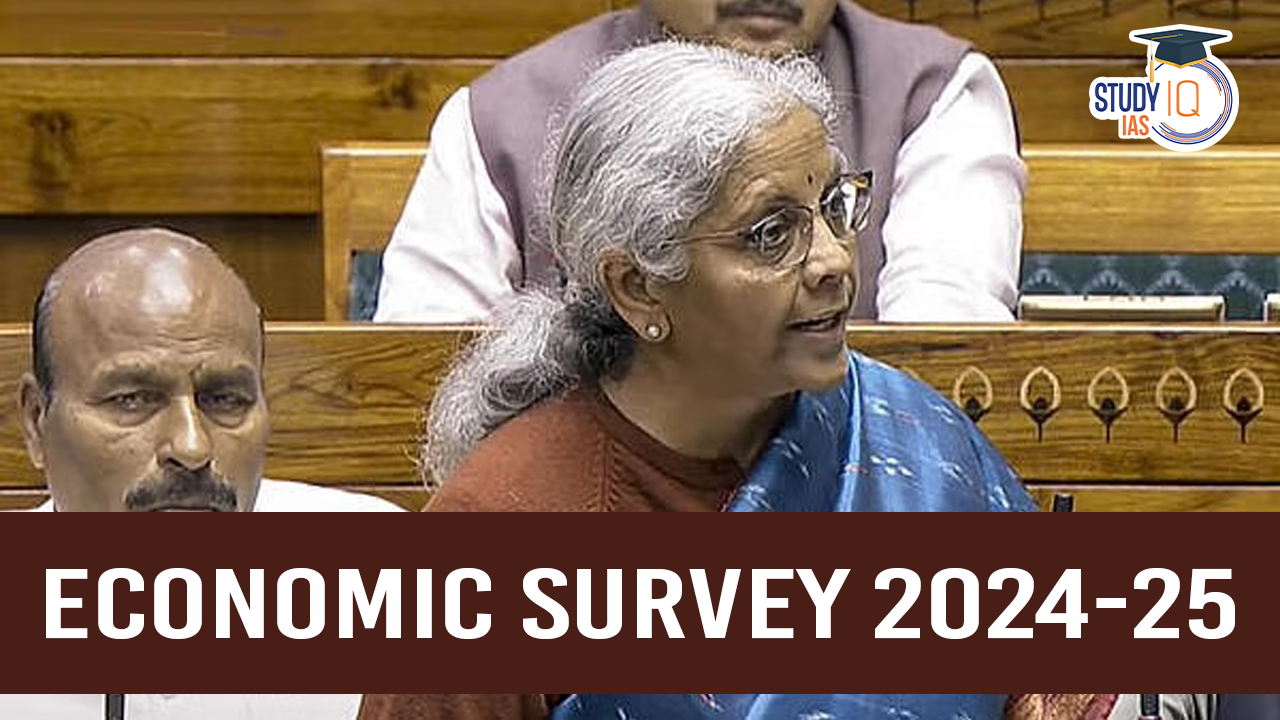The Economic Survey 2025 prepared by the Ministry of Finance has been an indispensable document in guiding the understanding of India’s performance over the past year and future policy directions. It encompasses insights into the growth in Gross Domestic Product, inflation trends, fiscal policy, employment, and key sectoral developments. A broad analysis of the survey is below.
Key Highlights of Economic Survey 2025
- GDP Growth Rate: Estimated at 6.5%, supported by private consumption and public investments.
- Inflation: Averaged around 5.2%, mainly due to fluctuating food and fuel prices.
- Fiscal Deficit: Targeted at 5.1% of GDP, showing the government’s commitment to fiscal consolidation.
- Current Account Deficit (CAD): Expected to moderate to 1.8% of GDP, supported by strong export performance.
Economic Survey 2025 Sectoral Analysis
| Sector |
Growth Rate (2024-25) |
Key Highlights |
Challenges |
Government Initiatives & Outlook |
| Agriculture & Allied Activities |
3.8% |
- Increased MSP for key crops
- Growth in the horticulture and dairy sector
- Agri-tech adoption rising
|
- Climate change impact
- Water scarcity issues
- Small farmers’ financial burden
|
- PM-KISAN scheme expansion
- Crop insurance improvements
- Digital agriculture push
|
| Manufacturing |
6.5% |
- PLI scheme boosted industrial production
- Growth in automobile and electronics sectors
- Make in India success
|
- Supply chain disruptions
- High input costs
- Labor market issues
|
- Expansion of PLI schemes
- Incentives for MSMEs
- Green manufacturing initiatives
|
| Services |
8.2% |
- IT and fintech leading growth
- Tourism rebounding post-COVID
- Healthcare and education services expanded
|
- Skill gap in workforce
- Uneven urban-rural growth
- Global economic uncertainty
|
- National Skill Development Mission expansion
- Digital India 2.0
- FDI inflow facilitation
|
| Infrastructure & Real Estate |
7.0% |
- PM Gati Shakti boosted logistics sector
- Housing demand increased
- Renewable energy projects gained momentum
|
- Delays in land acquisition
- High raw material costs
- Financing constraints
|
- Affordable housing push
- Smart city projects acceleration
- Increased public-private partnerships (PPPs)
|
| Banking & Finance |
6.9% |
- Credit growth improving
- Digital payments ecosystem strengthening
- NPAs under control
|
- Rising interest rates
- Global market volatility
- Inflationary pressures
|
- RBI’s digital currency pilot
- Financial inclusion schemes
- Strengthening of fintech regulations
|
| Energy |
5.8% |
- Growth in renewable energy adoption
- Domestic coal production increased
- Oil and gas sector reforms
|
- Dependence on imports
- Transition to green energy slow
- High subsidies burden
|
- Push for solar and wind energy
- Electric mobility incentives
- Hydrogen economy roadmap
|
| Trade & External Sector |
5.4% |
- Exports increased in IT, pharma, and textiles
- India signed FTAs with new countries
- FDI inflows steady
|
- Global demand fluctuations
- Geopolitical risks
- Trade deficit concerns
|
- Export promotion policies
- Strengthening of Atmanirbhar Bharat
- Trade diversification strategy
|
| Employment & Labor |
5.1% |
- Formalization of workforce increased
- Gig economy expansion
- MGNREGA played a crucial role
|
- Rural unemployment still high
- Low wage growth
- Skilling gap persists
|
- Skill India 2.0
- Strengthening of gig worker policies
- MSME employment push
|
| Digital & Technology |
9.1% |
- AI, blockchain, and IoT adoption rising
- 5G rollout boosted telecom sector
- Startups received record funding
|
- Cybersecurity threats
- Digital divide in rural areas
- Dependence on foreign tech
|
- Digital India expansion
- AI mission funding
- Strengthening data protection law
|
Policy Recommendations and Future Outlook
The Economic Survey 2025 emphasizes structural reforms, sustainable growth strategies, and technological advancements. Key recommendations include:
- Strengthening fiscal discipline while ensuring growth-oriented spending.
- Promoting private sector participation in critical infrastructure projects.
- Enhancing ease of doing business and regulatory frameworks.
- Addressing climate change challenges through green policies.
- Leveraging artificial intelligence and digital innovations for inclusive growth.
Conclusion
Optimistically yet pragmatically, India’s economic direction is outlined through the Economic Survey 2025. Resilience, digital transformation, and inclusive growth in the economic plan will help provide a basis for sustained economic development in the following years.
Sharing is caring!


 Gold Price Surge in India, Key Drivers a...
Gold Price Surge in India, Key Drivers a...
 Fiscal Slippage, Causes and Implications
Fiscal Slippage, Causes and Implications
 Serious Fraud Investigation Office (SFIO...
Serious Fraud Investigation Office (SFIO...





















